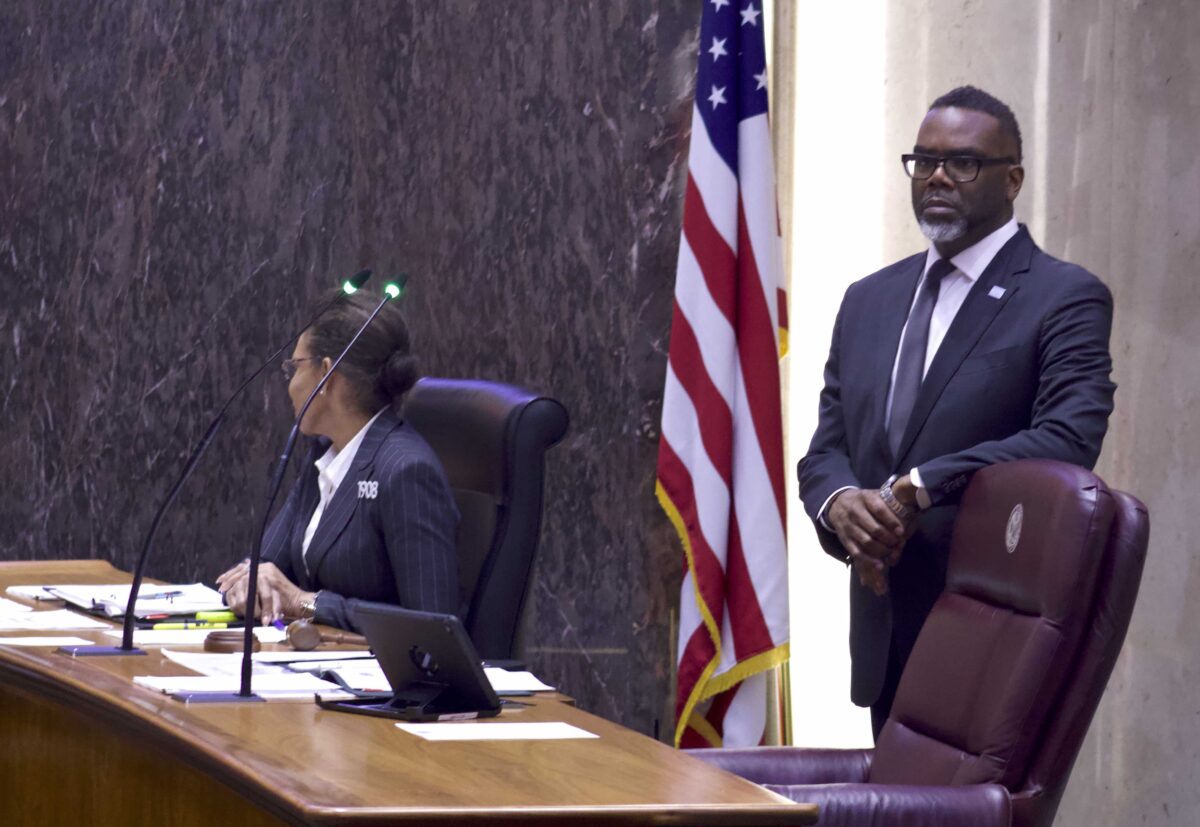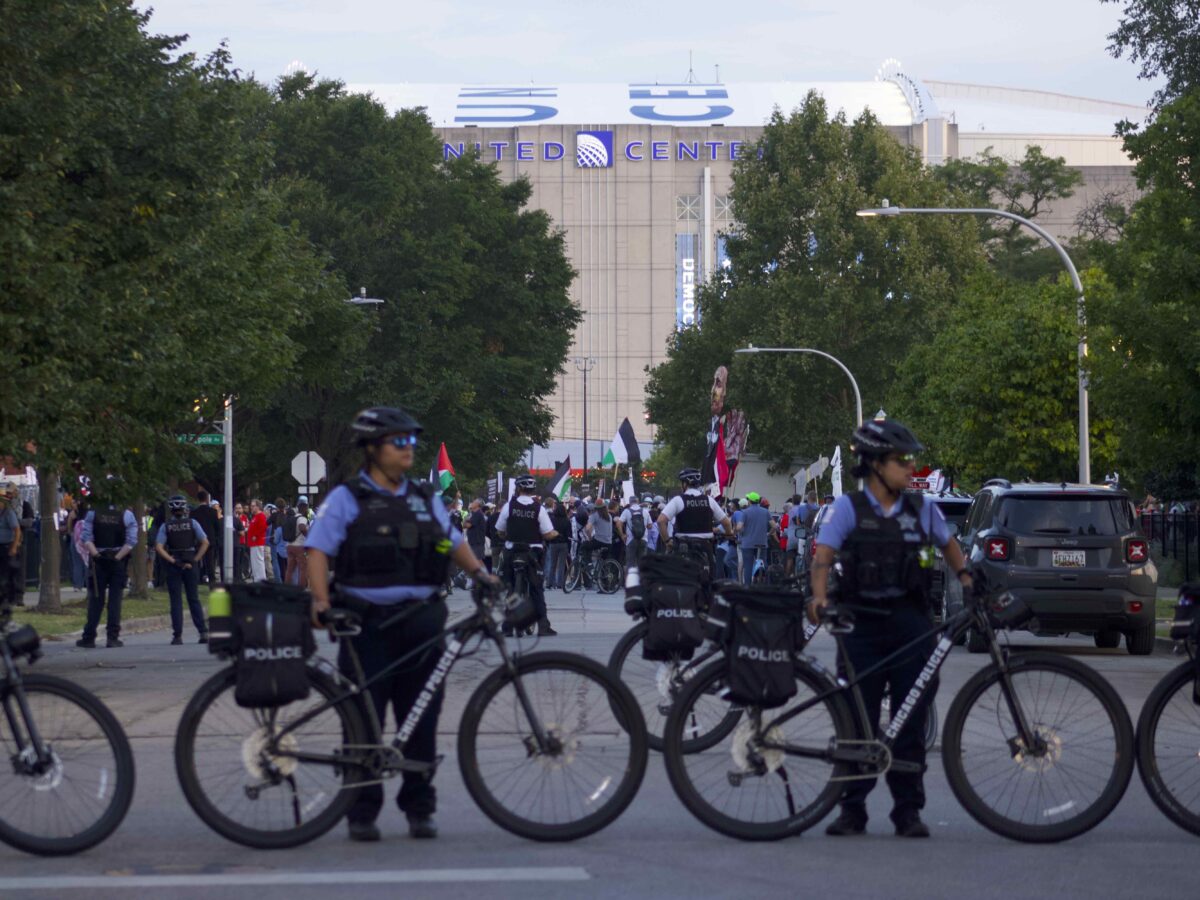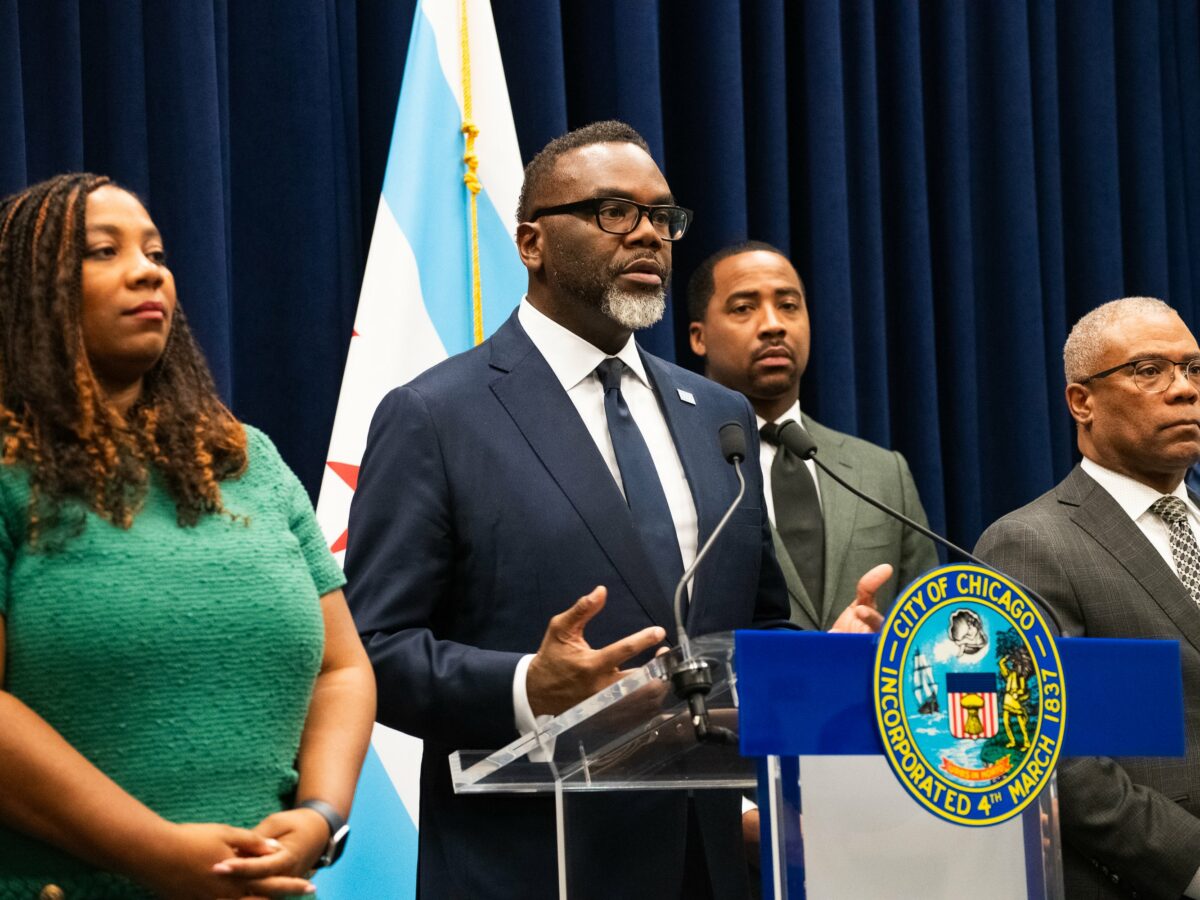Mayor Brandon Johnson must find a way to fill a nearly $1.2 billion hole in the city’s 2026 budget. He is betting he can do that in part by passing a corporate “head tax,” but it’s already facing stiff opposition from a majority of the City Council.
Johnson needs 26 out of 50 votes to pass his budget. The mayor is running out of revenue streams after his proposed $300 million property tax increase failed in a rare 50-0 vote last year. With property taxes a non-starter, that leaves few other options on the table to plug the city’s budget gaps.
The head tax would levy $21 per employee per month on companies with 100 or more full-time employees in Chicago who spend half of their time working in the city. The city’s budget office estimates the tax would generate $100 million annually, based on current employment data and the city’s business licensing records.
The city plans to dedicate that revenue to community safety and violence interruption programs that were once buttressed by federal COVID relief dollars. Those funds will dry up soon since the federal government mandated that cities must obligate their American Rescue Plan Act (ARPA) funds by the end of 2024 and must spend them before the end of 2026.
“It is important to note that more than 97 percent of Chicago businesses would not be impacted by this proposal,” Office of Budget and Management spokesperson LaKesha Gage-Woodard said in an email to the Weekly. “The intention is to ensure that the largest firms, who benefit most from the City’s workforce, infrastructure, and services, contribute proportionally.”
On Oct. 30, 27 out of 50 alders signed a letter opposing the head tax. Freshman Ald. Walter Redmond Burnet III, who the mayor just appointed to his father’s old seat in the 27th Ward, initially signed the letter and then asked for his name to be removed. Burnett represents the West Loop, a mecca for luxury buildings and corporate headquarters.
Chicago once levied a $4 per employee head tax on companies with fifty or more employees. In his 2011 campaign for mayor, Rahm Emanuel promised to phase out the head tax. The city claimed the tax brought in $35 million revenue in 2009 and 2010. That November, Emanuel congratulated the City Council for passing an ordinance that would phase out the head tax, which he called a “job killer,” by 2014.
If Chicago revived its head tax, it would make the city an outlier compared to the rest of the country, said Annie McGowan, a policy and research director at the Civic Federation, a local budget watchdog. Few other American cities levy a double-digit head tax: Denver’s is $4 a month for each employee, while Pittsburgh levies a payroll expense tax on employers. Seattle repealed its head tax in 2018, and a proposed head tax died in Cupertino, the home of Apple, that same year.
Governor J.B. Pritzker blasted Johnson’s head tax during an Oct. 21 event at the Economic Club of Chicago. It wasn’t the first time that Pritzker butted heads with the mayor. Between controversies over state spending and migrant shelters in Chicago, an apparent rift has grown between the two politicians over the last two years.
“I am absolutely four-square opposed to a head tax for the city of Chicago,” Pritzker said when asked about the proposal. He echoed the talking points of business groups who have argued that the tax would deter new companies and make it more difficult for those with an existing footprint in the city.
The governor then criticized Johnson’s budget for not offering enough “efficiencies.” When asked by the Weekly what cuts and solutions Pritzker would suggest, the governor’s office did not offer specifics.
“The Governor spoke from first-hand experience about the hard choices required to build and maintain a stable, balanced budget,” a spokesperson wrote in an email to the Weekly. “He has emphasized that lasting fiscal stability doesn’t come from one-time fixes, but from a combination of operational efficiencies, responsible budgeting, and growing the economy so revenues rise alongside opportunity. That approach has guided his work in Illinois.”
Despite the opposition, Johnson’s budget office appears determined to stick with the head tax. When asked about the administration’s contingency plan if the tax fails in City Council and whether the administration would propose a property tax increase again, the budget office pointed to a survey that rejected alternative revenue sources.
“Based on the citywide Budget Engagement Survey results, residents prioritized new revenues from a Community Safety Surcharge (i.e. the head tax), Online Sports Wagering tax, increased Vacant Building Fees, and other progressive revenue sources, while rejecting fees or revenue sources that would increase household costs,” Gage-Woodard said in an email to the Weekly. “The Office of Budget and Management remains ready to engage in conversations with City Council on proposals that ensure the City is not placing new burdens on working families in the midst of the largest upward transfer of wealth, at the federal level, to corporations and the wealthiest 1 percent of the population.”
Progressive budget gurus argue that Chicago’s job growth didn’t suffer when the head tax was implemented. Julie Dworkin, co-executive director for the Institute for the Public Good and a contributor to the mayor’s budget working group, used Bureau of Labor Statistics data to analyze employment growth rates in Chicago and the nation before and after the head tax’s repeal.
Between 2010 and 2013, the period that the Institute for the Public Good described as “post-recession and pre-repeal,” Chicago’s rate of job growth was 66% higher than the rest of the country. Yet between 2014 and 2019, “pre-COVID and post-repeal,” Chicago’s growth rate fell to 1 percent above the rest of the nation.
“This employment data does not support the claim that the head tax was a ‘job killer,’” the report reads.
Ralph Martire, the executive director of the Center for Tax and Budget Accountability, a bipartisan research organization, threw cold water on both sides of the debate.
“The peer-reviewed studies that I’ve seen have found no statistically meaningful correlation between tax policy and job growth or tax policy and business site location,” Martire said. “That doesn’t mean it doesn’t happen, right? Of course, some businesses will say, ‘Hey, I’m looking for a lower tax burden. So I’m going to site here rather than there.’ Of course, that decision happens, but it’s not a statistically meaningful driver of site decisions.”
Instead, when businesses are figuring out where to locate, they factor in proximity to customers and suppliers, financial markets, transportation hubs, and the quality of the workforce, Martire added.
“This is a subject where there’s not a lot of rationality, right? You have one side: ‘Businesses, corporations, need to pay their fair share,’” Martire said. “And you have the other side saying ‘Every tax is a job killer, and this in particular is a job killer because it’s on jobs.’ We all know those arguments. The truth, in this case, is very much somewhere in the middle.”
After leaning on federal COVID relief money for the last two years, Johnson may be squaring up for his toughest budget fight yet. Facing hard choices, his budget office has proposed reducing the advanced pension payments for the city’s four employee pension funds that cover police officers, firefighters, municipal workers, and laborers. In previous years, the city paid more than was necessary toward those four pensions, a move credit rating agencies loved—and one that meant the costs of pensions wouldn’t escalate in the future.
Between 2023 and 2025, the city used surpluses to help fund the advanced pension payments. Now that those funds are fully exhausted, Johnson’s budget office has proposed a lower pension payment. Budget analysts, credit agencies, and some alders chafe at that because they believe it kicks the can down the road, leading to more expensive payments for future taxpayers. While the measure would save money in the 2026 budget, it could lead to credit downgrades that make it more expensive for the city to borrow money to pay for capital projects, like building bridges.
“It’s not like all of these problems are the fault of the current mayoral administration,” McGowan said. “These are like bad decisions that have been made over time that have built up to the situation where we are now, and a lot of progress has been made to deal with these financial issues. It’s just that the pension cost is so large, it continues to crowd out the ability for the city to do everything else.”
Leigh Giangreco is a freelance reporter based in Chicago. You can follow her work on Twitter/X @LeighGiangreco and at leighgiangreco.com.





